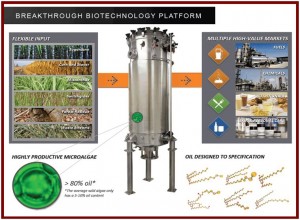
Solazyme’s renewable products can replace or enhance oils derived from the world’s three existing sources – petroleum, plants and animal fats.
With government subsidies waning, and private capital going elsewhere, 2013 is shaping up to be a crucial year for the alternative fuels industry. While proponents point to some progress – in 2012 about 9% of all transportation fuel used came from so-called alternative fuels from renewable sources – fracking and the resultant abundance of shale gas and oil are leading to renewed growth in the traditional fossil fuel industry.
The legal climate has turned against alternative fuels. The U.S. Court of Appeals in Washington D.C. recently said that EPA’s 2012 requirement for refiners to use cellulosic biofuel – or to purchase credits instead – was illegal since no cellulosic ethanol fuel was produced last year that the refiners could blend into gasoline. The decision came from a lawsuit brought by the American Petroleum Institute, which is actively fighting alternative fuels.
Starting in January of this year some of the more egregious subsidies for fuel production by agribusiness were eliminated, not that lobbyists aren’t trying to see them restored. U.S. taxpayers were handing agribusiness a subsidy of almost $7 billion annually to use corn to make ethanol, that totaled to more than $40 billion in pork – err corn – since the act’s passage.
These subsides are now gone; a 45-cent a gallon subsidy for ethanol blenders, and a protectionist tariff of 54 cents per gallon were dropped, the latter blocked much more efficient Brazilian sugar-cane derived ethanol, even though using Brazilian ethanol does nothing to help U.S. energy independence. Energy independence and longer term freedom from carbon-based fuels remain the vital goal of alternative fuels, ones that are clearly in the national interest to pursue vigorously. The U.S. currently sends more than $1,000,000 a minute to oil exporting nations, many of whom are hostile to us.
These alternative fuel setbacks come as myriad biofuel companies formerly supported by tax handouts are in the process of establishing what they claim will be commercial processing facilities. Amyris, Gevo, Solazyme, and POET are all in the process of ramping up allegedly commercial alternative fuel facilities.
It remains to be seen how ethanol – specifically E85 – now does at the pump. Currently it is not competitive even with the rising price of oil. In gasoline-gallon-equivalents (GGE or adjusted for the energy in a gallon of gasoline) E85 is currently selling for $4.91 a gallon on average.
“For this industry to actually move the needle on the fuel mix, it needs revenue – or else plants number two, three, and beyond will never materialize,” said Andrew Soare, Lux Research Analyst and the lead author of the report titled, “Leading Alternative Fuel Developers Race to Real Revenue in 2013.”
Lux Research positioned alternative fuel technology developers on a so-called Innovation Grid based on their Technical Value and Business Execution – companies that are strong on both axes reach the “Dominant” quadrant. They also assessed each company’s maturity, and provided an overall assessment.
In a helpful compendium, Lux looks at the alternative fuels sector as containing eight categories – crop modification, pretreatment, algae, gasification, bioprocessing, pyrolysis, torrefaction, and catalytic conversion.
Among the assertions of the report:
- Momentum and maturity exist in bioprocessing. Of the 30 bioprocessing companies analyzed, 13 are Dominant, with Amyris, Gevo, Solazyme, and POET in the top tier. All have high momentum and maturity, and are in the process of ramping up commercial facilities.
- Many algae companies face dim prospects. Of the 29 algae companies in the study, a whopping 23 are in the Long Shots quadrant, with low scores on both Technical Value and Business Execution. Only one, Algae.Tec, barely crossed the threshold to be classified as Dominant.
- Beta Renewables leads in pre-treatment. The biomass-to-sugars space features eight Dominant companies: Dyadic, Codexis, Novozymes, Beta Renewables, Renmatix, Blue Fire Renewables, REAC Fuel and Virdia. Beta Renewables and partner/investor Novozymes are scaling an initial commercial facility in Italy and have a loan guarantee for another in North America.
See AutoInformed on:

